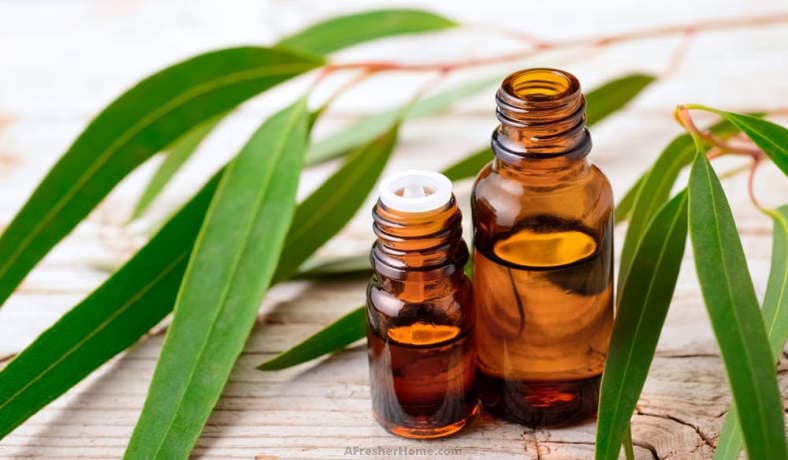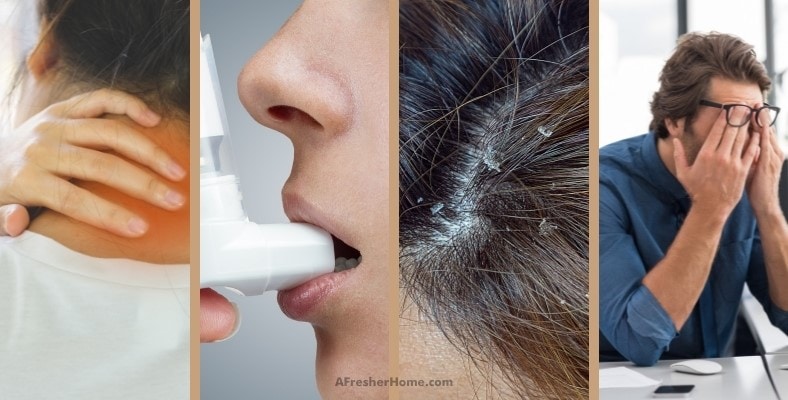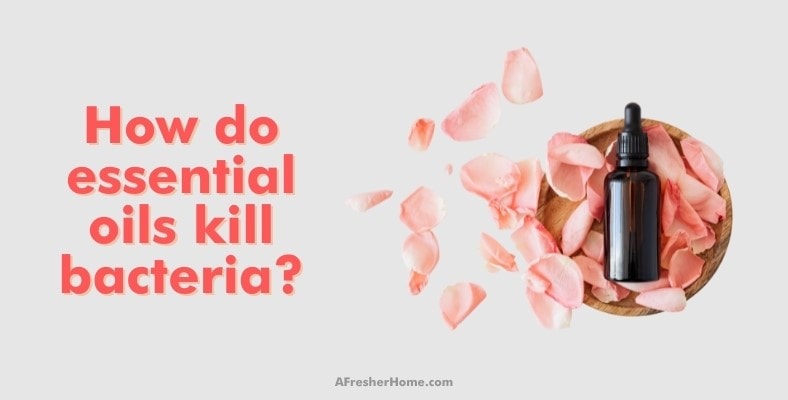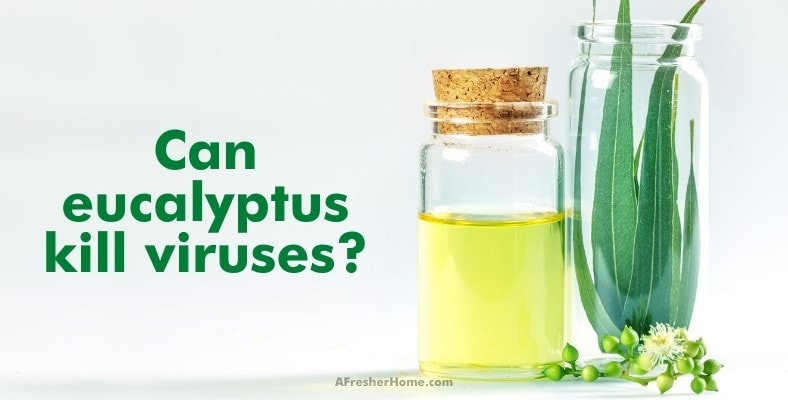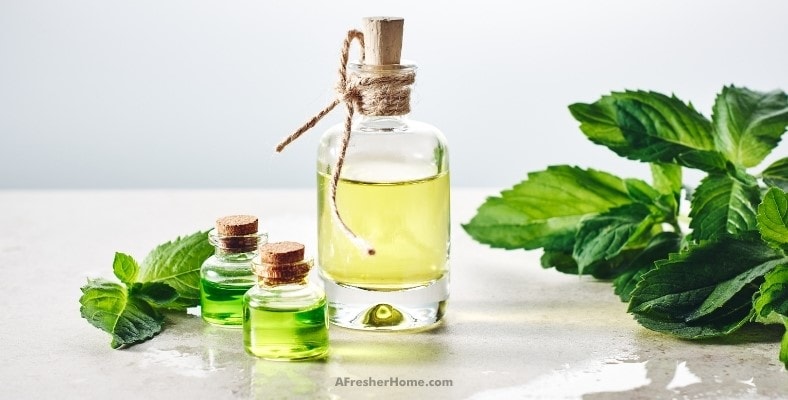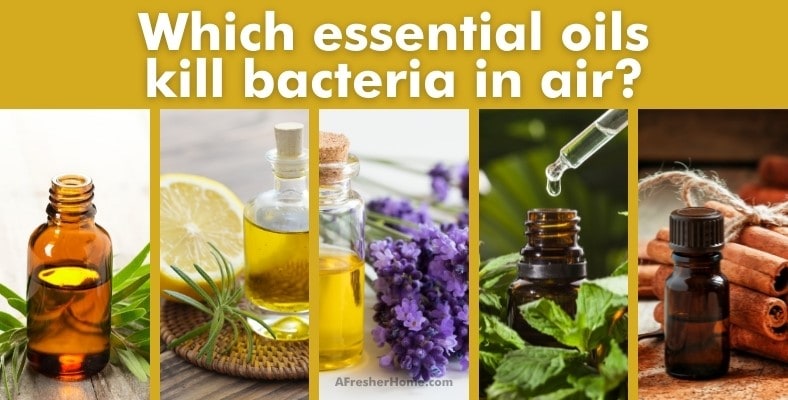There are quite a few essential oils that are used to kill germs and bacteria that are airborne – but is eucalyptus good for killing germs?
Read on to learn more!
Contents
Does Eucalyptus Oil Kill Germs in the Air?
Yes, there’s plenty of evidence that suggests that eucalyptus oil is able to kill some germs in the air.
Studies have found that the oil of the eucalyptus plant has antimicrobial properties against the following pathogens:
- S. aureus
- Streptococcus pyogenes (S. pyogenes)
- Salmonella typhi (S. typhi)
- Shigella spp.
- E. coli
- P. aeruginosa
Researchers in the study concluded that eucalyptus oil could potentially be used as a natural antibiotic for several infectious diseases.
However, you should also know that eucalyptus oil is highly toxic, even in small amounts, so you should NEVER ingest it. You should use it with a diffuser.
What is eucalyptus oil?
If you didn’t already know, eucalyptus oil comes from the eucalyptus tree which is native to Australia. Some of the health benefits that this wonderful essential oil provides include:
- reducing inflammation
- relieving asthma-related symptoms
- improving dandruff
- lowering stress levels
How Do Essential Oils Kill Bacteria?
Some essential oils naturally contain antibacterial and antimicrobial compounds. These types are the compounds that give them the ability to fight off pathogens and germs.
The specific compounds that the oil contains will depend on the type of oil in question. Two organic chemical compounds that fight against germs are:
- Aldehydes
- Phenols.
The first of these two, aldehyde, is a broad-spectrum disinfectant that has the ability to sterilize and kill fungi, bacteria, and viruses.
The second type, phenols, act as an antioxidant and has been shown to have antibacterial properties as well.
Can Eucalyptus Kill Viruses?
Yes, generally speaking, eucalyptus does kill several types of viruses including influenza A, mumps, and herpes HSV-1 & HSV-2.
Eucalyptus oil is something that has a strong scent meaning that it has potent germicide properties. That’s what helps make it ideal for helping to fight off infections, bacteria, and viruses.
The germicidal quality of this essential oil also makes it ideal for use as an antiseptic and that’s why you can use it to treat burns, cuts, wounds, ulcers, abrasions, and sores.
It can even be used as a cleaning solution to kill any viruses that have been left behind on surfaces.
Does Peppermint Oil Kill Bacteria?
Peppermint does contain mild antimicrobial properties but whether it is able to kill bacteria is not known for sure.
Some people would argue that peppermint oil has the ability to kill bacteria but others say it doesn’t.
The problem is that despite studies being carried out the results were mixed. Ultimately the antimicrobial ability of peppermint oil depends on the species of bacteria as it’s effective against certain types of bacteria.
You’re much better off using an essential oil that’s well known for killing germs and microbes rather than relying on peppermint oil.
Which Essential Oils Kill Bacteria in Air?
There are many different essential oils that can be used to kill off bacteria in the air. To purify germs and viruses in the air you should diffuse about 8-10 drops of essential oils in a room diffuser or diffuse them directly by using a nebulizer without water.
Here’s a list of the best essential oils to cleanse the air around you.
Tea Tree Oil
One of the essential oils that are able to kill bacteria in the air is tea tree oil. It’s really useful for killing topical and airborne bacteria and viruses.
It’s also a natural antiseptic and antifungal oil that can kill mold. It’s ideally used to treat fungal infections, eliminate the growth of mold, and destroy viruses and bacteria.
You can combine tea tree oil with eucalyptus essential oil to create an even more potent mixture. This is a formula that is known to kill E.coli and fight off staph infections.
Peppermint Oil
Peppermint is an essential oil that has antifungal, antiviral, and antibacterial properties including fighting the symptoms of a common cold. It can also be used to kill a variety of different types of fungi, viruses, and bacteria.
With all of these properties, peppermint essential oils are a great way to boost your immune system, and it comprises compounds like camphor, carvacrol, and menthol which are resistant to many dangerous strains of bacteria.
It’s also great for helping to purify the air in your home, as it is effective at killing germs while providing a refreshing smell. However, as I mentioned earlier, it’s not one of the best germ killers when compared to other essential oils like tea tree and eucalyptus.
Lemon Oil
Lemon essential oil has antifungal, antibacterial, and antiviral properties. It’s also really useful as a great cleaning agent.
Use it to disinfect surfaces, clothes, and even your body. You can also add it to white or cider vinegar to create the perfect cleaning solution for bacteria.
Lavender Oil
Lavender essential oil is another antibacterial oil that is able to boost your immune system and resist diseases and viruses. Due to its antiseptic and antibacterial properties, it can also be used to treat various skin conditions like psoriasis, acne, and other inflammatory conditions of the skin.
It can also be used to stop infections in cuts, wounds, and burns.
Cinnamon Oil
Cinnamon essential oil is an extremely potent antibacterial essential oil, and it is often used to treat a variety of different ailments and to kill viruses and bacteria.
